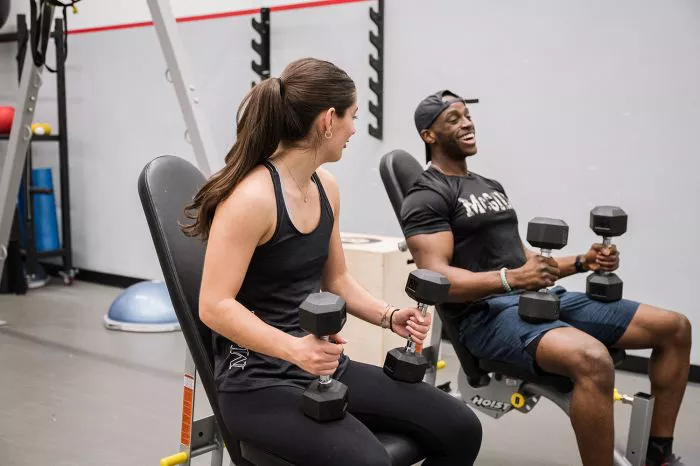The question of whether to eat before a gym session is a common one, and the answer depends on several factors, including individual preferences, goals, and the type of workout planned. Eating before a gym session can provide fuel for energy and optimize performance, but the timing and composition of the pre-workout meal can impact digestion, comfort, and overall workout experience. In this comprehensive exploration, we delve into the pros and cons of eating before the gym, the ideal timing and composition of pre-workout meals, and practical considerations to help individuals make informed decisions based on their specific needs and preferences.
Pros of Eating Before the Gym
Increased Energy Levels: Consuming a pre-workout meal can provide the body with carbohydrates, which are the primary source of energy during exercise. Eating before the gym can help maintain blood sugar levels and provide fuel for optimal performance and endurance during workouts.
Improved Performance: Having adequate fuel in the form of food before a workout can enhance performance by supporting strength, power, and intensity. Eating before the gym may help individuals push harder, lift heavier weights, and sustain exercise intensity for longer durations.
Muscle Preservation: Consuming protein before a workout can help prevent muscle breakdown and promote muscle protein synthesis. Including protein in the pre-workout meal can provide amino acids necessary for muscle repair and recovery, especially during resistance training or high-intensity workouts.
Reduced Fatigue: Eating before the gym can help prevent fatigue and improve mental focus and concentration during workouts. Carbohydrates provide readily available energy for the brain and muscles, helping individuals stay alert and motivated during exercise.
Cons of Eating Before the Gym
Digestive Discomfort: Eating a large or heavy meal too close to a workout can lead to digestive discomfort, bloating, and cramping during exercise. Digestion requires blood flow and energy, which may divert resources away from muscles, leading to feelings of sluggishness or discomfort.
Risk of Indigestion: Certain foods, especially those high in fat, fiber, or spices, can be harder to digest and may increase the risk of indigestion or gastrointestinal distress during workouts. Foods that are high in fat or fiber may sit in the stomach longer, leading to feelings of fullness or heaviness.
Impact on Performance: For some individuals, eating before a workout may lead to a feeling of heaviness or lethargy, which can negatively impact performance and motivation. Individuals may experience decreased agility, speed, or endurance if they feel weighed down by food during exercise.
Individual Variability: The impact of eating before the gym can vary depending on individual factors such as metabolism, digestive sensitivity, and exercise intensity. What works well for one person may not be suitable for another, highlighting the importance of personal experimentation and listening to the body’s cues.
Ideal Timing and Composition of Pre-Workout Meals
Timing: The ideal timing of a pre-workout meal depends on individual preferences, digestion rate, and the type of exercise planned. As a general guideline, consuming a meal or snack containing carbohydrates and protein approximately 1-3 hours before a workout can provide adequate fuel without causing digestive discomfort.
Composition: A balanced pre-workout meal should include carbohydrates for energy, protein for muscle repair and recovery, and a small amount of fat for satiety. Examples of suitable pre-workout snacks include:
Greek yogurt with fruit and granola
Whole grain toast with peanut butter and banana
Oatmeal with berries and nuts
Chicken or turkey sandwich on whole grain bread
Smoothie with protein powder, fruit, and spinach
Hydration: In addition to food, hydration is essential before a workout to prevent dehydration and optimize performance. Drinking water or a low-calorie beverage before exercise can help maintain fluid balance and support thermoregulation during workouts.
Practical Considerations for Eating Before the Gym
Experimentation: It’s essential to experiment with different pre-workout meal timings, compositions, and portion sizes to determine what works best for individual needs and preferences. Keep a food and workout journal to track energy levels, performance, and digestive comfort after different meals.
Personal Preferences: Consider personal preferences, lifestyle factors, and workout timing when planning pre-workout meals. Some individuals may prefer to eat a full meal 2-3 hours before exercise, while others may opt for a smaller snack closer to their workout time.
Portion Control: Avoid overeating before a workout, as large meals can lead to feelings of fullness and discomfort during exercise. Opt for smaller, balanced meals or snacks that provide adequate energy without causing bloating or heaviness.
Individual Sensitivities: Be mindful of individual sensitivities or intolerances to certain foods, such as dairy, gluten, or high-fiber foods. Choose foods that are easily digestible and well-tolerated to minimize the risk of digestive discomfort during workouts.
Listen to Your Body: Pay attention to hunger cues, energy levels, and feelings of fullness before and during workouts. If you feel hungry or fatigued, consume a small snack or beverage to boost energy levels and sustain performance.
Conclusion
The decision of whether to eat before the gym depends on individual preferences, goals, and workout timing. Eating before a workout can provide fuel for energy, optimize performance, and support muscle repair and recovery. However, the timing and composition of the pre-workout meal should be tailored to individual needs and preferences to avoid digestive discomfort and optimize workout performance. By experimenting with different pre-workout meal options and listening to the body’s cues, individuals can find a strategy that works best for them and supports their fitness goals effectively and comfortably.
Related Topics:
Which type of gym workout is best?


